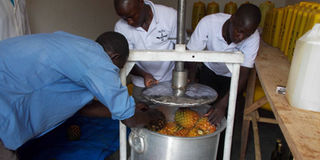When life gives you pineapples, make wine

Pineapple production is a major economic activity in the sub-counties of Kyannamukaaka and Kyesiiga, Masaka District. Photo by Michael J Ssali
What you need to know:
- A youth group in Masaka is enhancing their income from what they have in plenty.
- That is, adding value by making wine from pineapples, Michael J Ssali writes.
Mellow Wines Kyannamukaaka is a group of about 100 young farmers and fruit traders in Kindu Catholic Parish, Masaka Diocese, who have undertaken to produce wine from pineapples to enhance their income.
Fr Gerald Lwanga, who coordinates their activities, explains: “When I was posted here last year as Youths Chaplain, I discovered that the youth complained about lack of money which was manifested by their small church offerings. Yet I was aware that they worked hard as farmers, growing passion fruit and pineapples.”
Further investigation showed that they were exploited by traders from South Sudan, Kenya and Kampala who bought the produce at discouragingly low prices.
For example, they sold each pineapple at between Shs200 and Shs400. Yet they invested a lot of time, energy, and money to cultivate the fruits.
They were always forced to sell them off at the prices set by the traders since the fruits are perishable.
If they did not get rid of the fruits quickly, they would rot and they would not earn any money at all.
“I found that in the entire parish which comprises of two sub-counties, Kyanamukaaka and Kyesiiga, there are more than 800 households engaged in growing pineapple and passion fruits,” Fr Lwanga adds.
It was after such findings that the priest thought about teaching the youth under his pastoral care about value addition.
This is so that they would turn the fruits into products that would take longer to perish and which they would sell at their own set prices.
“I discussed the idea with them and they formed a group comprising mainly fruit farmers. I invited a food scientist, Emmanuel Kakooza, who has been teaching them about wine making,” Fr Lwanga says.
“We are also looking at the possibility of making and packing fruit juice. There is the need to go into value addition since as we have discovered many traders who buy the fruits actually sell them to juice processors.”
So far the emphasis is on making wine out of pineapples but more products including packaged juice will be made out passion fruit.
Nalongo Mugerwa, a group member, points out that they have noticed that it is more profitable to make wine out of the pineapples than to sell the fruits directly to the traders.
She explained the numbers behind the claim: “From 10 pineapples, bought at Shs800 each, we make 25 bottles of wine. We then sell each bottle at Shs10,000.”
So far the group has acquired a manual juice extraction machine, which was designed by the group instructor, Kakooza.
It has the capacity to squeeze enough juice to make one hundred bottles of wine a day.
“Of course we have to factor in the overhead costs like purchasing yeast and sugar, labour and other costs altogether totalling to Shs40,000. We are fully convinced that if our project takes off we are bound to make reasonable profit,” she said.
She went on to reveal this work is being carried out in the back yard of the Fathers’ residence at the mission and that they are making wine samples and selling them locally until they obtain certification from the Uganda Bureau of Statistics (UNBS).
Stephen Ddungu said he was pleasantly surprised that their group buys pineapples at Shs800 each from the farmers and uses them to make a product that fetches so much profit. “Those fellows [traders] cheat us, paying as little as Shs200 a pineapple.”
Fr Lwanga adds: “We also focused on value addition to teach the youth about self-sustenance through exploiting the available resources within their immediate environment.”
Since the fruits are available, they should be their source of increased income and a tool to fight poverty as well as unemployment.
In future, the group plans to set up a fruit processing plant in the area where the fruits are grown.
For now, the juice extraction is time-consuming and labour intensive. However, electricity is available in the area and they are working towards getting electric-operated machines.
“With a factory, there will be employment for the community as increased fruit production will feed the factory,” says Emmanuel Kakooza, who has been supervising the project. “[With] value addition, fruit wastage is likely to reduce by 90 per cent by 2020.”
To note
As long as the group follows the wine processing guidelines they are bound to succeed.
The basic stages of production as: collecting the fruits from the garden, washing and brushing them at the processing unit, juice extraction, waste disposal and management, fermentation, browning after two weeks of fermentation, filtering after four weeks, testing of alcoholic volume, and bottling.
By selling pineapples in their raw form, the local farmers miss the opportunity to use the by-products (what remains after the juice has been squeezed out) which are good feed for farmed animals like pigs and cattle.




